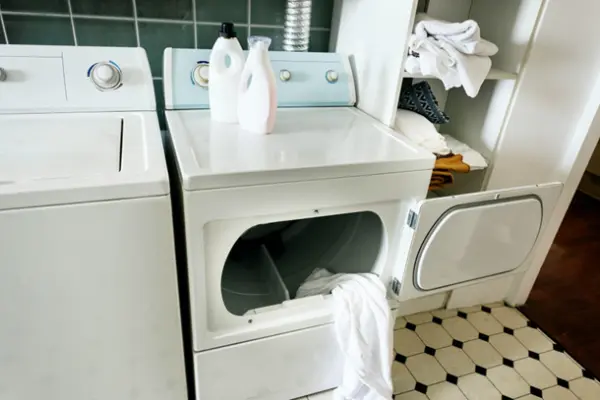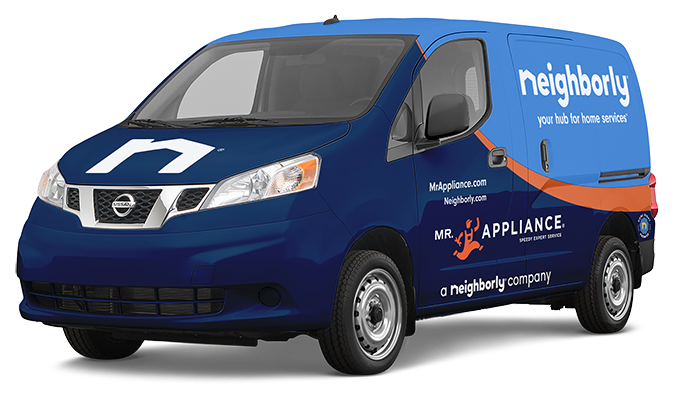
Nothing's more frustrating than opening your washer to find soaking wet clothes that should have been spun dry. When your washing machine stops spinning correctly, it's not just an inconvenience—it can turn laundry day into a soggy nightmare. Fortunately, many spinning issues have identifiable causes and solutions.
At Mr. Appliance of Plano, we've diagnosed and repaired countless washer-spinning problems throughout the area.
Whether you're dealing with a high-end Sub-Zero unit or a previously reliable Whirlpool model, understanding what might be wrong can help you decide whether to attempt a DIY fix or call in the professionals.
What are the Common Causes of Washer Spinning Problems?
Don't worry; you don't need to invest in a professional washer appliance repair solution just yet. There are some pretty common problems out there that may just need a little attention to get things moving again.
Unbalanced or Overloaded Washer
The most frequent culprit behind spinning issues is an unbalanced load. Modern washers have safety mechanisms that prevent spinning when clothes are distributed unevenly or overloading the drum, protecting both your machine and your home from damage.
Signs of load imbalance:
- Washer shaking or vibrating excessively
- Loud banging noises during the spin cycle
- Clothes bunched up on one side of the drum
Quick fix: Redistribute clothes evenly around the drum, ensuring you haven't overloaded the machine. Remove some items if necessary, and restart the cycle.
Faulty Lid Switch or Door Lock
Top-loading washers rely on lid switches, while front-loaders use door locks to ensure the machine won't spin with an open door. When these safety components fail, your washer won't enter the spin cycle.
Symptoms include:
- Washer fills and agitates, but won't spin
- No response when you close the lid or door
- Error codes on digital displays
This is typically a job for professional appliance repair, as it involves electrical components and safety mechanisms that require proper tools and expertise.
That said, visually check the locking system of the drum. If something's blocking it, that could be the issue.
Worn or Broken Drive Belt
Many washers use a drive belt to transfer power from the motor to the drum. Over time, these belts can stretch, crack, or break completely, preventing the spin cycle from working.
Warning signs:
- Washer makes noise, but the drum doesn't move
- Burning rubber smell during operation
- Visible belt damage when inspecting the machine
Belt replacement requires disassembling your washer parts and should be handled by qualified technicians to avoid damage or injury.
Clogged Drain Pump or Filter
If water can't drain properly, many washers won't proceed to the spin cycle. Lint, coins, small clothing items, or other debris can clog the drain pump or filter.
Indicators of drainage issues:
- Standing water in the washer drum
- Clothes still soaking wet after the cycle
- Gurgling sounds during drainage
While you can check and clean the filter yourself (consult your manual), pump problems typically require professional attention.
Faulty Motor or Control Board
Sometimes, the issue lies deeper within your washer's electrical system. A failing motor or malfunctioning control board can prevent proper spinning.
Complex symptoms might include:
- Intermittent spinning problems
- Unusual error codes
- Complete failure to respond to controls
These sophisticated repairs require diagnostic equipment and technical expertise that only trained appliance repair specialists possess.
Worn Shock Absorbers or Suspension Components
Front-loading washers rely on shock absorbers, while top-loaders use suspension springs and rods to stabilize the drum during high-speed spinning. When these components wear out, excessive vibration triggers safety mechanisms that prevent spinning.
Warning signs include:
- Violent shaking during spin attempts
- Loud banging or grinding noises
- Washer "walking" across the floor
This type of repair involves heavy components and precise installation, making it a job for experienced technicians.
What are the Brand-Specific Considerations to Think About?
Different washer brands have unique characteristics that can affect spinning performance:
Samsung washers are a great, quality product but some stacked washers have trouble when overloaded. This includes a major recall affecting 2.8 million units due to top units becoming unbalanced or detaching at high speeds back in 2016. Their VRT (Vibration Reduction Technology) can ironically cause spinning problems in some models.
LG and Samsung washers often feature advanced sensors that are particularly sensitive to load balance and may stop spinning more readily than other brands.
Whirlpool and Maytag models are known for durability but may develop drive belt issues over time, especially in units with heavy use. The Whirlpool Cabrio series has known shift actuator problems that can prevent proper spinning.
Bosch and Miele's washers typically have more complex control systems that can generate specific error codes to help diagnose spinning problems. Miele's F53 error specifically indicates speed sensor issues.
Sub-Zero and Viking appliances represent premium investments that deserve expert care to maintain their performance and protect your warranty.
Why is My Washer Not Spinning in Plano?
Living in Plano presents unique challenges for washing machine performance.
North Texas water averages over 200 PPM hardness, ranking the 6th hardest water in the nation. This mineral-rich water creates scale buildup that particularly affects spinning mechanisms and drain pumps.
Texas's isolated power grid is also prone to summer brownouts that can damage washing machine motors and electronic controls. Voltage fluctuations specifically impact spin cycle performance during peak air conditioning demand.
Additionally, Plano's expansive clay soil causes foundation movement that creates vibration issues. Many homes experience settling that leads to uneven washer installation, triggering excessive vibration during high-speed spins.
Bear this in mind. Just because your washer isn't spinning, that doesn't mean you need to front the cost of replacing it. There are plenty of well-known issues that can be fixed and repaired, saving you a ton of time and money.
When to Call a Professional Washer Appliance Repair in Plano
While checking for obvious issues like unbalanced loads is reasonable, many spinning problems require professional diagnosis and repair. Here's when you should contact Mr. Appliance of Plano:
- Electrical components: Lid switches, door locks, motors, and control boards involve electrical work that can be dangerous without proper training.
- Internal mechanisms: Drive belts, pumps, and transmission components require specialized tools and knowledge to access and replace safely.
- Warranty protection: DIY repairs on newer appliances can void warranties while professional service maintains coverage.
- Safety concerns: Washers contain heavy components and high-voltage electrical systems that pose injury risks to untrained individuals.
Cost considerations: In the Dallas-Fort Worth area, typical spinning problem repairs range from a few hundred dollars, while new units typically start at a few thousand dollars.
That said, for machines over 10 years old, repairs exceeding 50% of the replacement cost are probably not worthwhile.
Why Choose Mr. Appliance of Plano
Our local team understands the unique challenges Plano residents face, from hard water effects on appliance components to the wear patterns common in our climate.
We service all major brands, from everyday Whirlpool units to luxury Sub-Zero appliances, with the same commitment to quality and customer satisfaction.
Our technicians arrive equipped with common replacement parts, often completing repairs in a single visit. We stand behind our work with comprehensive warranties and offer transparent pricing with no hidden fees.
How to Prevent Future Washer Spinning Problems
Regular maintenance can help prevent many washer spinning issues:
- Load management: Avoid overloading and ensure balanced loads
- Monthly cleaning: Clean the lint filter and wipe down seals
- Quarterly maintenance: Inspect hoses and test lid switches
- Proper products: Use appropriate detergent amounts to prevent excessive suds
- Annual inspections: Professional maintenance can catch problems before they cause breakdowns
- Water quality: Consider a water softener to combat Plano's hard water effects
Time to Get Your Washer Spinning Again
Don't let a non-spinning washer disrupt your routine. Whether dealing with a simple load imbalance or a complex mechanical failure, the solution is just a phone call away.
Mr. Appliance of Plano combines local expertise with professional-grade tools and parts to get your laundry room back to normal quickly and efficiently.
Contact us today for a reliable washer repair service that Plano families have trusted for years.
Your clothes, schedule, and the general smell around your home will benefit beautifully.
